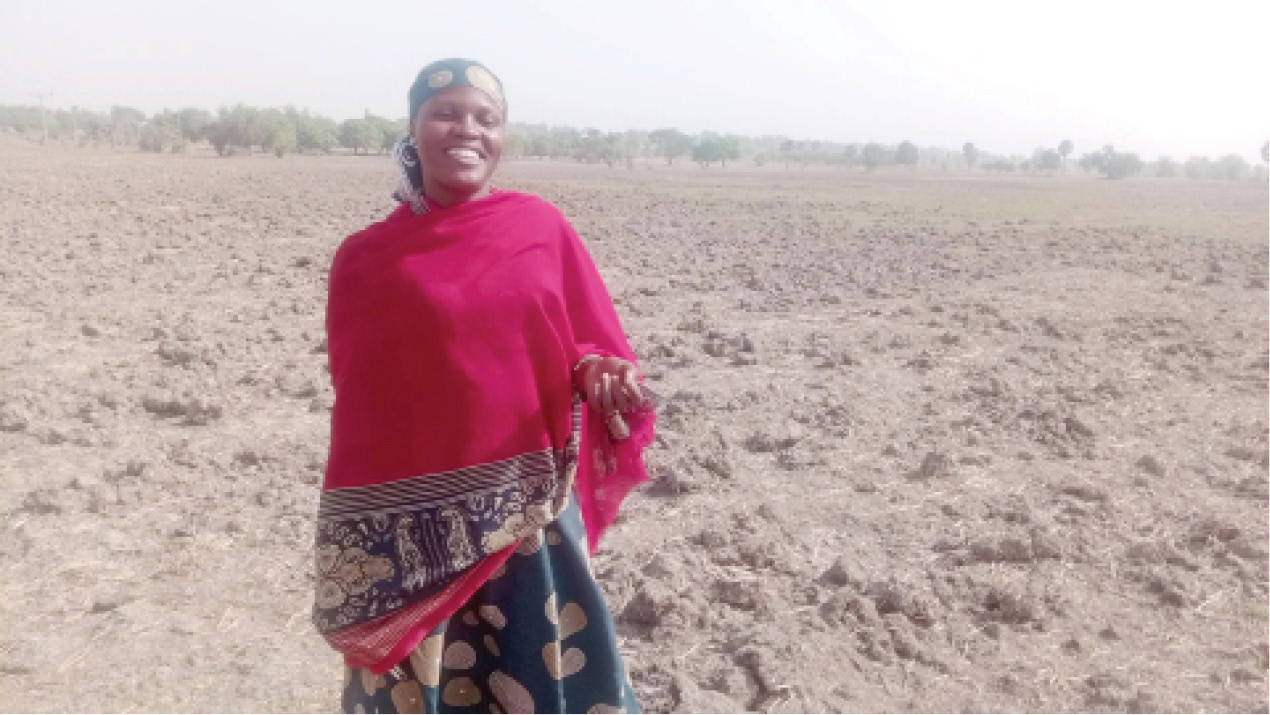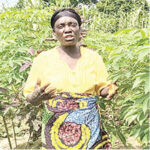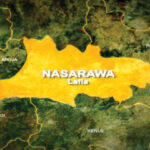For smallholder female farmers, the last farming season was a difficult one as COVID-19 further worsened their economic situation. Many of them faced deepening income crisis.
According to the National Gender Policy in Agriculture, women constitute 49 per cent of Nigeria’s population and actively “carry out about 80 per cent of agricultural production, 60 per cent of processing activities and 50 per cent of animal husbandry and related activities, yet women have access to less than 20 per cent of agricultural assets.”
- Family members of murdered ISIS fighters repatriated to Abuja
- PODCAST: IDP Camps: A Ticking Time Bomb
They are the most neglected segment and government’s agriculture policies do not give them equal platform to excel in the sector.
In the last few years, they have organised themselves into the Small-Scale Women Farmers Organisation in Nigeria (SWOFON), a coalition of women farmers’ associations and groups across Nigeria; and since 2014, more than 14,283 individual female farmers and 1,217 cooperative groups registered with the group in Nasarawa State.
The smallholder women farmers have gone through hardships and suffered neglect in the state. The farmer-herder crisis of 2014 and the Ombatse conflict of 2011 and 2015 affected thousands of local farmers; many were killed while others migrated from their villages.
These crises, along with the current COVID-19 pandemic, created more need for support because their means of livelihood has been severely affected.
Prior to 2019 elections, the SWOFON submitted a charter of demands to the state government, asking for access to free or subsidised farming inputs, such as organic fertiliser, chemicals, pesticides and hybrid seedlings; the establishment of peace committees between community heads and local government chairmen to tackle insecurity/farmer-herders crisis, and the provision of gender-friendly machineries for increased productivity for farming, such as harvesters, tillers, hand sprinklers, ploughs, planters, etc.
Other demands include “allocation of community land – 500 hectares for cluster farming across different value chains, access to grants to support increased production, as well as subsidised loans without interest rates or single digit interest rate.
To deal with the impact of COVID-19 at the federal level, government set aside about N3.5trillion with a three-month repayment moratorium for targeted groups, including FarmerMoni loans, a Targeted Credit Facility (TCF) of N50billion to businesses hampered by the pandemic, and a further N500bn COVID-19 Crisis Intervention Fund, etc.
Also, as part of its economic recovery strategy, the federal government came up with the Mass Agricultural Programme to enhance the entire agricultural value chains, from farm to table to cost about N634.98bn, which was expected to bring between 20,000 and 100,000 hectares of new farmland under cultivation across the 36 states in a multi-layered approach.
But findings showed that none of these demands was met by the state and federal governments and the women spoken to in this investigation did not receive any palliative from either level of government.

Women cry out
Our reporter who visited five local government areas of the state to meet members of several smallholder women farmers discovered that most of their demands have not been met and their challenges grew even worse, in addition to the damaging effect of climate change.
Even the state budgetary allocation to agriculture has been abysmal during the last four years, and releases have been awful, making impact in the sector very little.
Mrs Hajaratu Godwin is a SWOFON member in the Bukan Sidi area of Lafia, the state capital. The 54-year-old mother of four has three hectares of land near Kwandere, where she has farmed for over 20 years, cultivating groundnut, cassava, sorghum, maize and rice.
She said that life as a smallholder female farmer had been challenging in the last few years.
“Even before the coming of COVID-19, we were struggling to buy all we need for the farm. As a woman, getting fertiliser is difficult, let alone credit facility from the government. The men have an upper hand. I have never received fertiliser, seed, credit facility or even any palliative from the government during COVID-19.
“In the last three years, I have been relying on manure from ashes, sawdust from carpentry shops, as well as rice bran from rice mills around Lafia to fertilise the farm. It is only when you do this that you can harvest something reasonable from the farm. Even if you bring it, you have to pay women at least N20,000 to spread it all around the farm,” she said.
Beside these huge challenges, climate change has also complicated her problems, and her farm yields and income have been dropping since 2018.
In 2020, she planted groundnut three times because of erratic rainfall, resulting in her harvesting just 7 bags as against the 20 bags she usually got.
The smallholder farmer is worried that her income is going down because she no longer affords the increasing cost of labour and inputs, which have risen significantly as the farm where she pays about N30,000 has now gone up to N100,000.
In Akwanga, Mrs Barakisu Kooto, who is the breadwinner in her family as her husband died a few years ago, spends most of her time in the farm and the little resources she makes help to support the education of her children. But life is now becoming more challenging.
Mrs Kooto, who used to raise rabbits and broilers, can no longer sustain production. The small hutch for rabbits and chicken pen she built are now empty.
“They are empty because of lack of money. If I had gotten little resources I would have restocked those pens, in addition to the crops I produce,” she said.
She said the challenges of getting access to basic farm inputs because of lean resources had resulted in low yield, which translated into low income. She added, “The crops we plant need more fertiliser since the soil is getting tired.”
This situation is the same with Mrs Hanatu Bako, 37, and Mrs Victoria Alkali, the leader of the smallholder female farmers in Obi Local Government Area of the state.
“These days, for you to buy two bags of fertiliser you have to struggle because it sells above N10,000,” Mrs Bako said, noting that government has failed to support them as earlier promised.
For Mrs Alkali, two major issues resonate, which further weaken their declining incomes. “The first is the issue of farm destruction by cattle. I lost my cassava completely after suffering to cultivate. And we can’t challenge the herdsmen as women or we risk being killed. We don’t even have security men around here to check their excesses. We are just left at the mercy of God.
“The second issue is climate change. Last year, my beneseed [sesame] did not do well because rain suddenly stopped. I lost money. Insufficient rain is making life difficult for us as smallholder farmers.
“Despite our several complaints, nothing is being done,” she lamented.
In Keana and Doma local government areas, women go through the same difficult situation. The destruction of their farms by cattle herders is at the heart of the major challenges confronting them.
Mrs Katime Sameki in Keana and Margaret Danjuma in Doma are pained by what they described as neglect of women, which makes them more vulnerable to every bad situation.
“When you suffer to cultivate cassava, you will just wake up one day and see that everything is gone. As a woman, if you talk they will either rape or kill you. Even if you see them you are compelled to remain silent or just say your prayer.
“My yam and cassava are gone. I don’t even know what to do any more,” Mrs Danjuma said.
Poor agric budget implementation
Out of the Nasarawa State 2021 budget of N115.722billion, agriculture and water resources got N6.5bn, which represents about 5.76 per cent of the total budget, whereas governance/security got N14.3bn (12.66%) and health N11.4bn (10.10%).
Responding, the Commissioner for Agriculture and Water Resource, Professor Allananah O. Otaki, agreed that the state government had not met the expectations of the people in agriculture as far as budgetary allocation was concerned.
“You will understand with me that about 98 per cent of the general population are farmers, and as such, the budget that is allocated to them is supposed to be higher when compared to education. This is because if we really want to achieve the food security we have been yearning for, the allocation given to agric is supposed to be high,” he said.
No support for female farmers
Speaking on the current administration’s efforts at revitalising the sector, the Commissioner for Agriculture and Water Resource, Professor Allananah O. Otaki, however, admitted that much work needed to be done in terms of support for female farmers.
He said the state government procured fertiliser for all the 13 local governments to be sold to farmers at a subsidised price of N5,000; but many of the women spoken to said they did not benefit.
He admitted that the state was yet to have a legal instrument that would allow women to have the necessary agricultural support.
“I think that so far, we haven’t come out with a law to empower women on agriculture, but we have it at the back of our minds to give more attention to farmers,” he said.
He agreed that something should be done to “allow our women full participation. They have enough time. And because of their ability and creativity, if they are given an opportunity to partake in agric, I think they can help in solving the food insecurity we are facing in the country.”
This report was made possible with support from the International Budget Partnership (IBP).

 Join Daily Trust WhatsApp Community For Quick Access To News and Happenings Around You.
Join Daily Trust WhatsApp Community For Quick Access To News and Happenings Around You.


